2010 年黑龙江成人英语三级考试真题及答案
Part I. Vocabulary and Structure (10 points; 15 minutes)
Directions: Eachofthefollowingsentencesisprovidedwithfourchoices.Choose
the one that best completes the sentence. Then blacken the
corresponding letter on the Answer Sheet.
1. As preparations were not completed in time, the conference had to be __________
till the next Tuesday.
A. put away
C. put aside
B. cancelled
D. postponed
2. ___________ with the size of the whole earth, the highest mountain does not seem
high at all.
A. When compared
C. While comparing
B. Compare
D. Comparing
3. It’s only a short way to the station, so we might as __________ walk.
A. good
C. quick
B. now
D. well
4. Liquids are like solids __________ they have a definite volume.
A. in that
C. with that
B. for that
D. at that
5. Since she can speak Japanese fluently, she has an advantage __________ other job
applicants.
A. to
C. over
B. in
D. against
6. Yesterday’s English examination looked simple, but it turned out to be __________
easy.
A. nothing but
C. something but
B. everything but
D. anything but
7. It was raining hard, but by the time class was over, the rain __________.
A. stopped
C. had stopped
B. would stop
D. might have stopped
8. “Perhaps you should go home now.” “No, I __________ on staying here for a while
longer.”
A. persist
C. sit
B. stick
D. insist
9. Hardly __________ to the bus stop when the bus suddenly pulled away.
A. did they get
C. they got
B. they had got
D. had they got
10. It is necessary that the plan __________ before Thursday.
A. were fulfilled
B. was fulfilled
�
C. be fulfilled
D. would be fulfilled
11. Not only __________ our money, but we were also in danger of losing our lives.
A. we lost
C. did we lose
B. lost we
D. we did lose
12. I __________ a doctor now, if I had studied medical science in my youth.
A. were
C. had been
B. should be
D. should have been
13. I knocked at the door several times __________ an elderly lady came to answer
it.
A. before
C. unless
B. after
D. then
14. He seemed very young, but __________ he was older than all of us.
A. in nature
C. by nature
B. in reality
D. in origin
15.
You may
not
have played
very
well today,
but
at
least
you’
ve
got
through to
the
next
round
and
__________.
A.
C.
tomorrow
never
comes
B.
tomorrow
is
another
day
never
put off
till
tomorrow
D.
there
is
no
tomorrow
16. It has been said that in no country __________ Britain can one experience four
seasons in the course of a single day.
A. other than
C. better than
B. more than
D. rather than
17. __________ you are familiar with the author’s ideas, try to read all the sections
as quickly as you possibly can.
A. Now that
C. So that
B. Ever since
D. As long as
18. —Tom is so worried about the test that he said he was going to study all night.
—Tell him he should quit __________ and get some help.
A. to have worried
C. worrying
__________
in
19.
A.
C.
The trees
being
blowing
blown
down
down
B. to worry
D. from worrying
have
blown
to
the storm
B.
D.
moved
off
the road.
been
down
blow down
20. The boy the teachers considered __________ failed in the final exam, __________
surprised them very much.
A. to be the best; which
C. to have been studying well; it
B. as the best student; that
D. such as a good student; which
Part II. Cloze Test (10 points;20 minutes)
Directions: Read the passage through. Then, go back and choose one suitable word
�
or phrase marked A, B, C, or D for each blank in the passage. Blacken
the corresponding letter of the word or phrase you have chosen on the
Answer Sheet.
. A big lorry which had been
As it came near the corner, the taxi stopped suddenly. The driver got out looking
the taxi stopped too. The taxi driver
the lorry driver went
to stop as well and soon a large
very 21
was now standing at the corner looking up at the sky
to
crowd of people
25
gathered at the corner.
him. A number of cars behind were
22
23
24
26
The
27
28
C. tired
31
37
40
33
36
39
D. guilty
D. guiding
34
the noise seemed to be coming
35
29
were singing together. The noise was quite
of all this trouble was a very strange
the attention of passers-by. The police asked the
two policemen arrived. They noticed a large advertisement
B. unhappy
B. leading
B. yet
B. connect
B. determined
B. has
. It sounded as if
thousands and thousands of
30
and many people looked disturbed. The most extraordinary thing was that, apart from
was not a bird in sight. No one was able to solve the
one or two pigeons,
mystery
a
this
film high up on a wall nearby.
direction, they climbed up and found that a tape-recorder had been hidden
the
advertisement. The noise made by birds singing was being broadcast over powerful
loudspeakers so as to
38
to take the recorder away because the advertisement had attracted
much
attention that it was
for a great many cars and buses to move freely in the
street.
21. A. puzzled
22. A. pushing
23. A. but
24. A. share
25. A. agreed
26. A. having
27. A. result
28. A. case
29. A. cocks
30. A. exciting
frightening
31. A. there
32. A. before
after
33. A. for
34. A. When
35. A. in
36. A. behind
37. A. pay
38. A. managers
passers-by
39. A. too
40. A. impassable
C. following
C. and
C. join
C. forced
B. in
B. Before
B. to
B. over
D. so
D. charge
D. persuaded
D. tape-recorders
D.
B. this
B. impossible
B. noise
B. children
C. improper D. unnecessary
D. cause
D. picture
D. by
D. As
D. from
D. on
C. to
C. After
C. attract
D. attack
B. advertisers
C. drivers
B. interesting
C.
convincing
C. thing
C. birds
C. have
D. had
C. such
D. so
B. point
C. effect
C. into
C. above
B. here
B. until
C. it
C. when
D. that
D.
32
B. give
D.
�
Part III. Reading Comprehension (40 points; 55 minutes)
Section 1
Directions: Each of the following three passages is followed by some questions.
For
each question there are four choices. Choose the best answer to each
question. Then blacken the corresponding letter on the Answer Sheet.
Passage One
Questions 41 to 45 are based on the following passage.
For the past twenty years, poll-takers (民意测验者) have told us that the vast
majority of Americans report that they are “satisfied” or “very satisfied” with
their jobs. But, when the surveys pose a slightly different question—“If you had
to do it over, would you choose the same line of work?”—sixty percent of working
Americans say they would choose another occupation. This seems to tell us that
Americans feel that they are supposed to like their jobs but, in reality, they don’
t. Most of us are stuck in jobs we’d prefer not to have. And some of us actually
hate what we do.
How does this happen in a land where citizens are presumably free to do, and
become, anything they want? First of all, some of us didn’t deliberately choose
our jobs but simply fell into them. Later, there was never time to find out what
we really wanted to do.
Another reason people dislike their jobs is the result of a change in the American
economy. A hundred years ago most Americans worked for themselves on farms or in
small stores and workshops. Now, less than 10 percent of us are self-employed. Many
of us work as cogs (轮牙) in the wheels of giant corporations. We don’t make a finished
product with our own hands, and we feel that we are totally replaceable parts in
the machine. Social scientists say that the happiest workers are the ones who are
their own bosses—business owners, executives, and professionals. Working for a big
company often results in a sense of powerlessness and malaise. Finally, being a
member of the baby boom generation increases the chances of job dissatisfaction.
In the struggle for careers among the members of this large population “bulge”,
many people are losing out in the competition. These individuals may never achieve
the standard of living their parents achieved, or go as far up the success ladder
as they had hoped. The result is bitterness, and a feeling of being trapped in a
“nowhere” job.
41. The best title for this selection is __________.
A. Job Satisfaction
B. Why People Hate Their Jobs
C. Nowhere Jobs
D. A Change in the Workplace
42. Which sentence best expresses the main idea of the selection? __________.
A. Job burnout is a growing problem
B. Large companies provide many benefits for workers
C. Workers are unhappy because they no longer work with their hands
�
D. There are several reasons why workers are unhappy with their jobs
43. According to the passage, the majority of Americans __________.
A. would choose another occupation if they could begin again
B. are self-employed
C. feel that they are supposed to dislike their jobs
D. work in factories
44. The author implies that __________.
A. job dissatisfaction is a sign of laziness
B. the baby-boomers despise their parents
C. polls can be misleading
D. working for a corporation is very satisfying
45. The word “malaise” (Line7, Para. 3) means __________.
A. depression
C. contentment
B. fulfillment
D. significance
Passage Two
Questions 46 to 50 are based on the following passage.
Most forest fires are caused by human carelessness or ignorance. Forest fire
prevention, therefore, is mainly a problem of creating better understanding of the
importance of forests, an awareness of the danger of fire in the woods, and a sense
of personal responsibility to safeguard the forests from danger. This is not an easy
job.
Careless smokers are responsible for thousands of forest fires each year. Many
of these are started when cigarette butts (烟 蒂 ) and matches are thrown from
automobiles. Others are caused by hunters, hikers (徒步旅行者), fishermen, or woods
workers who are careless in disposing of their smoking materials. The Forest Service
has posted rules in many of the National Forests that prohibit smoking except in
certain designated areas. Many of the states have laws against throwing lighted
materials from automobiles. The prevention of smoker-caused fires, however, depends
upon changing the attitudes and behavior of millions of people who smoke in hazardous
areas.
The most important natural cause of fire is lightning (闪电). This accounts for
11 percent of forest fires on protected land for the entire nation. In the Western
States, lightning causes a much higher percentage of fires than it does in the East.
Advances in knowledge of fire weather are helping forest protection forces to
know when to be alert to lightning-caused fires. Adequate and well-equipped forces
can control them quickly and hold the damage to a minimum. Experiments in “seeding”
thunder clouds to prevent or control the lightning itself have been in process for
many years, but new breakthroughs are needed for any significant reduction in the
fires lightning starts.
46. This passage is chiefly about __________.
A. smoking in forests
B. changing the attitudes and behavior of millions of people
C. the chief causes of forest fires and their prevention
�
D. advances in knowledge of fire weather
47. Preventing smoker-caused forest fires is mainly a problem of __________.
A. building the proper knowledge and habits in human beings
B. safeguarding the forests from fire
C. posting rules in forests
D. holding the damage to a minimum
48. Lightning-caused fires can be controlled quickly by __________.
A. holding the fire damage to a minimum
B. people who have changed their attitudes and behavior
C. enough fire fighters with good fire-fighting devices
D. carrying out experiments in “seeding” thunder clouds
49. “Alert to” (Line 2, Para. 4) most probably means __________.
A. aware of
C. responsible for
B. watchful for
D. busy with
50. Which of the following statements is true according to the passage? __________.
A. It is difficult to prevent forest fires
B. Smoking is allowed only in certain forests
C. 11% of the forest fires in the Western States are caused by lightning
D. Experiments in “seeding” thunder clouds have helped reduce lightning-caused
forest fires
Passage Three
Questions 51 to 55 are based on the following passage.
Some years ago industries had more freedom than they have now, and they did not
need to be as careful as they must today. They did not need to worry a lot about
the safety of the new products that they developed. They did not have to pay much
attention to the health and safety of the people who worked for them. Often new
products were dangerous for the people who used them;often conditions in the work
place had very bad effects on the health of the workers.
Of course sometimes there were real disasters( 灾 难 ) which attracted the
attention of governments and which showed the need for changes.Also scientists who
were doing research into the health of workers sometimes produced information which
governments could not ignore.At such times, there were inquiries into the causes
of the disasters or the problems. New safety rules were often introduced as a result
of these inquiries;however, the new rules came too late to protect the people who
died or who became seriously ill.
Today many governments have special departments which protect customers and
workers. In the U. S., for example, there is a department which tests new airplanes
and gives warnings about possible problems. It also makes the rules that aircraft
producers must follow. Another department controls the foods and drugs that
companies sell.A third department looks at the places where people work,and then
reports any companies that are breaking the laws which protect the health and safety
of workers. Of course,new government departments and new laws cannot prevent every
accident or illness,but they are having some good results. Our work places are safer
and cleaner than before. The planes and cars which we use for travel are better.
�
Producers are thinking more about the safety and health of the people who buy and
use their products.
51.The main topic of the passage is _________.
A. conditions in the work place
C. changes in industrial production
B. the freedom of industries in the past
D. the safety and health of workers and
customers
52. It can be inferred from the passage that in the past _________.
A. workers often got ill because of the poor working conditions
B. companies were free to put out any products they wanted to
C. many people were killed by dangerous products
D. industries were as careful in management as they are today
53. It is implied in the passage that _________.
A. governments and companies had different opinions about the safety of products
B. governments paid little attention to the safety of products
C. government officials often did not listen to scientists
D. in the past no safety laws were introduced by governments
54. Some years ago safety rules _________.
A. were put forward due to scientists’ recommendations
B. came into being as a result of the workers’ demands
C. were introduced because quite a number of people were killed or seriously
injured
D. were effective enough to protect workers and customers
55. The special departments protect customers and workers in many ways EXCEPT
by _________.
A. testing new products
C. designing new products
B. controlling the sale of products
D. inspecting work places
Section 2
Directions: Readthefollowingpassage,andthendecidewhetherthestatementsare
true(A)orfalse(B).Thenblackenthecorrespondingletter(AorB)ontheAnswer
Sheet. (对的在答题卡上涂 A, 错的在答题卡上涂 B)
Passage Four
Questions 56 to 60 are based on the following passage.
When someone who is in good health dies suddenly, there is usually an inquest.
An inquest is a kind of court inquiry. The person in charge of an inquest is
called a coroner (验尸官). His job is to find out exactly how a person died.
If there is nothing suspicious (怀疑的) about the death, he would decide that
the person died from natural causes or an accident. If, however, he is suspicious,
he may decide that the person’s death was caused by a person or persons unknown.
At one inquest, the coroner was trying to find out exactly what had caused the
death of a local businessman, Henry Smith.
The man’s widow was offering the evidence. She was very upset and had to stop
from time to time.
�
The coroner did not want to upset her more than necessary, but he had to find
out the truth. There were questions he had to ask her.
“Mrs. Smith, I know this is too much for you,” he said, “but I want you to
think very carefully and then answer my questions.”
“You and your husband were having dinner at home. Is that correct?”
“Yes.”
“Suddenly he fell to the floor.”
“Yes.”
“Did he say anything?”
The widow lowered her head.
“Please, Mrs. Smith, you must answer the question. What were his last words?”
The widow took a deep breath and then spoke. “He said,” she whispered, “I’
m not surprised you were charged only 50 cents for that seafood we had for dinner.”
(
(
(
) 56. An inquest is done in one’s home.
) 57. The coroner decides on the nature of a person’s death.
) 58. The coroner was very careful in asking Mrs. Smith questions so as not to
upset her.
(
(
) 59. Mrs. Smith was quick to tell the truth.
) 60. The bad seafood was responsible for Mr. Smith’s death.
Part IV. Short Answer Questions (10 points; 15 minutes)
Directions: Inthispartthereisashortpassagewithfivequestionsorincomplete
statements.Readthepassagecarefully.Thenanswerthequestionsorcompletethe
statements in the fewest possible words (not exceeding 10 words) . Write your
answers on the Answer Sheet of Paper Two. (请将此部分的答案写在试卷二的答题纸
上)
Questions 61 to 65 are based on the following passage.
All of us communicate with one another nonverbally as well as with words. Most
of the time we’re not aware that we’re doing it. We gesture with eyebrows or hands,
meet someone else’s eyes and look away, or change positions in a chair. These actions
we assume are occasional. However in recent years researchers have discovered that
there is a system to them almost as consistent and understandable as language.
One important kind of body language is eye behavior. Americans are careful about
how and when they meet one another’s eyes. In our normal conversation, each eye
contact lasts only about a second before one or both of us look away. When two
Americans look searchingly into each other’s eyes, they become more intimate.
Therefore, we carefully avoid this, except in suitable situations.
Researchers who are engaged in the study of communication through body movement
are not prepared to spell out a precise vocabulary of gestures. When an American
rubs his nose, it may mean he is disagreeing with someone or refusing something.
But there are other possible interpretations, too. Another example: when a student
in conversation with a professor holds the older man’s eyes a little longer than
usual it can be a sign of respect, it can be a challenge to the professor’s authority,
or it can be something else entirely. The researchers look for patterns in the
�
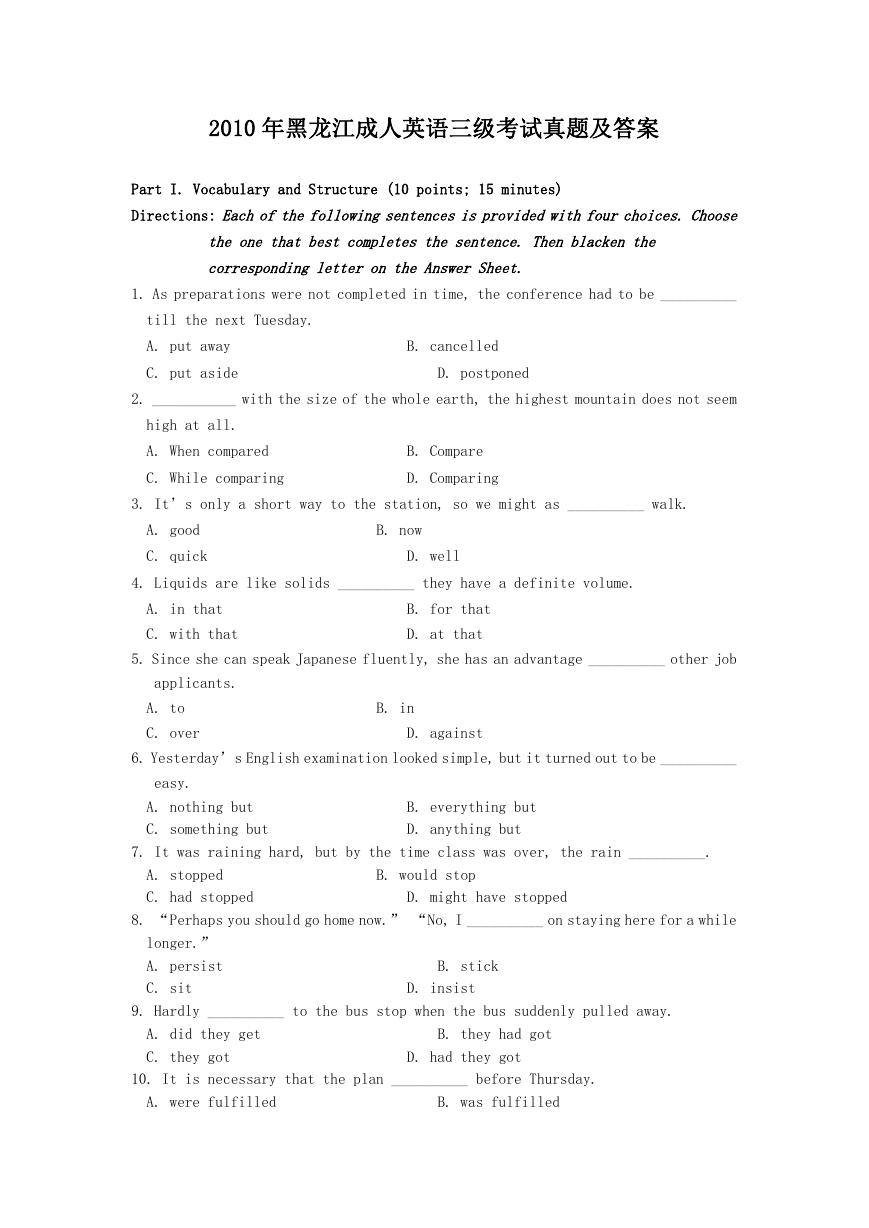
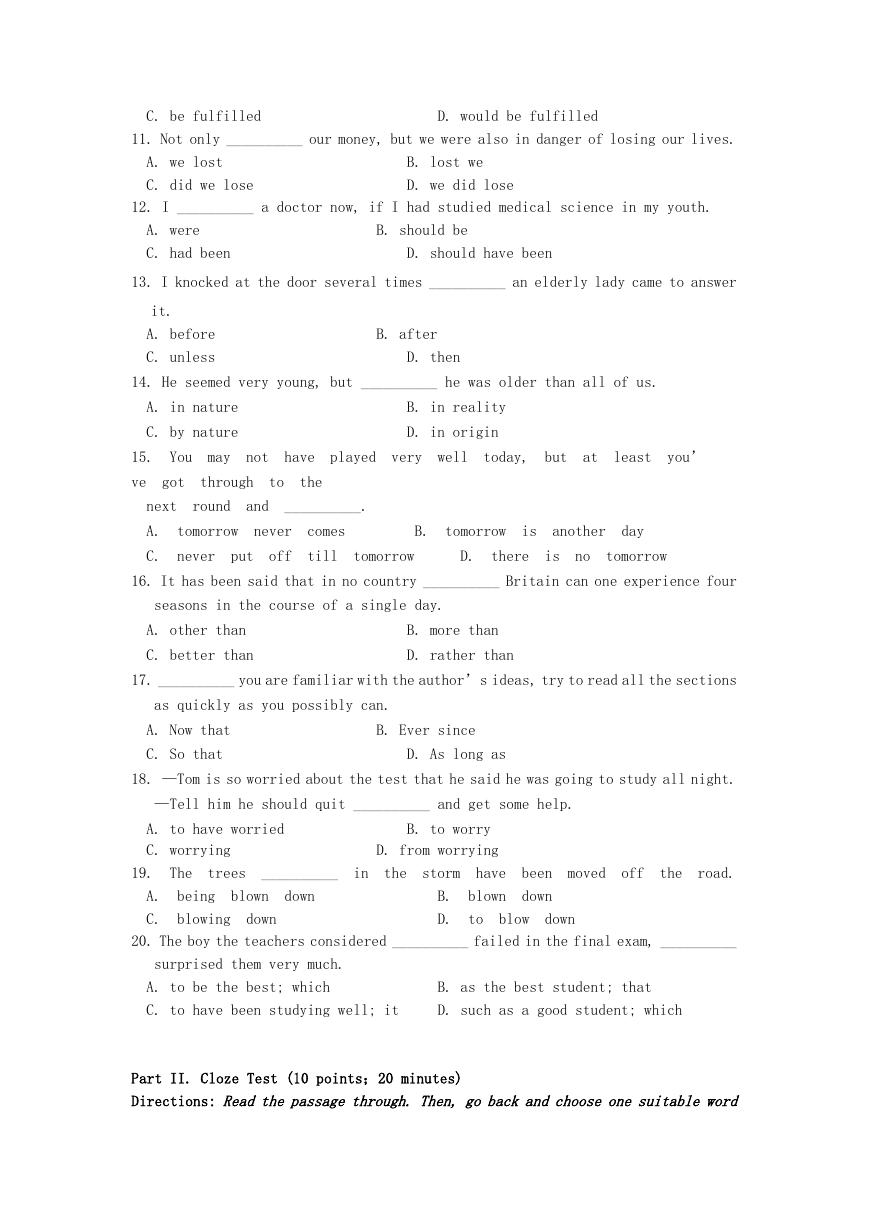

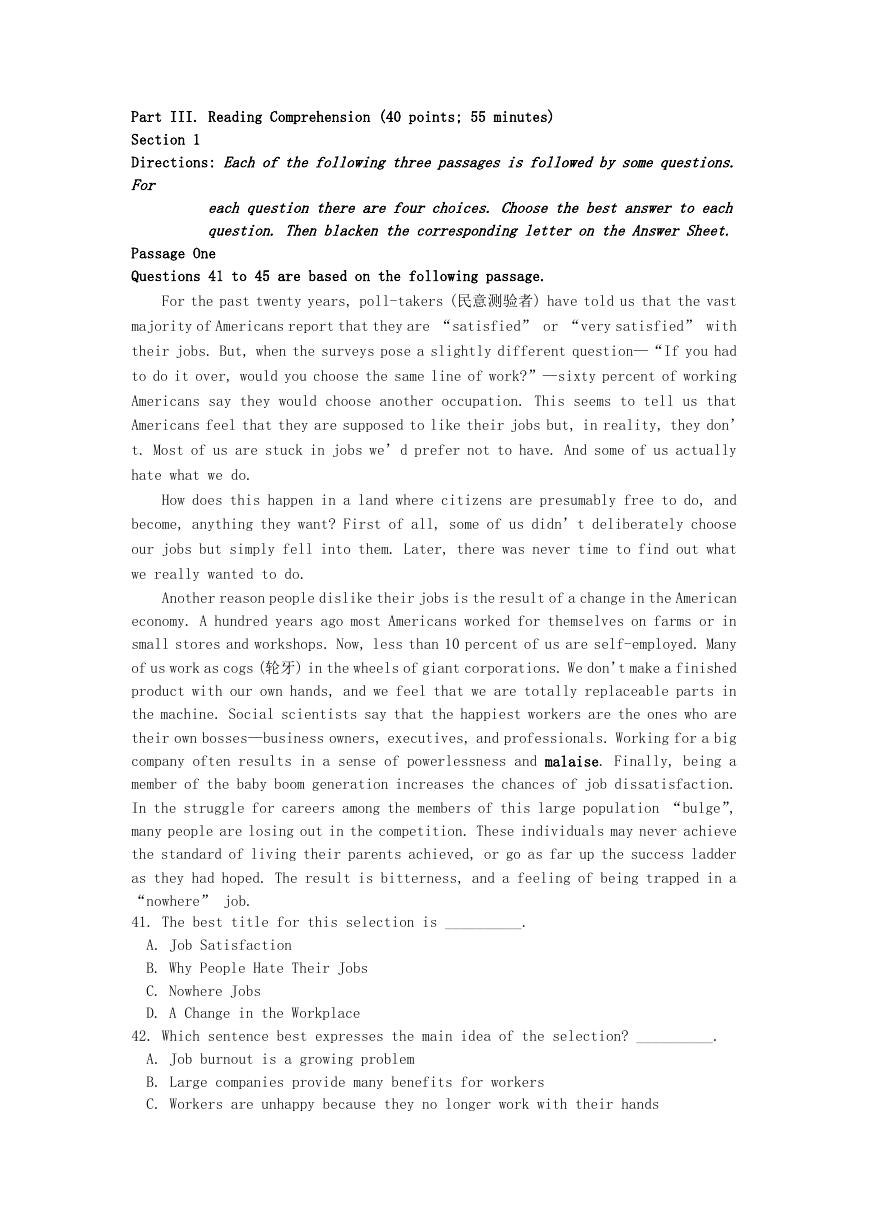


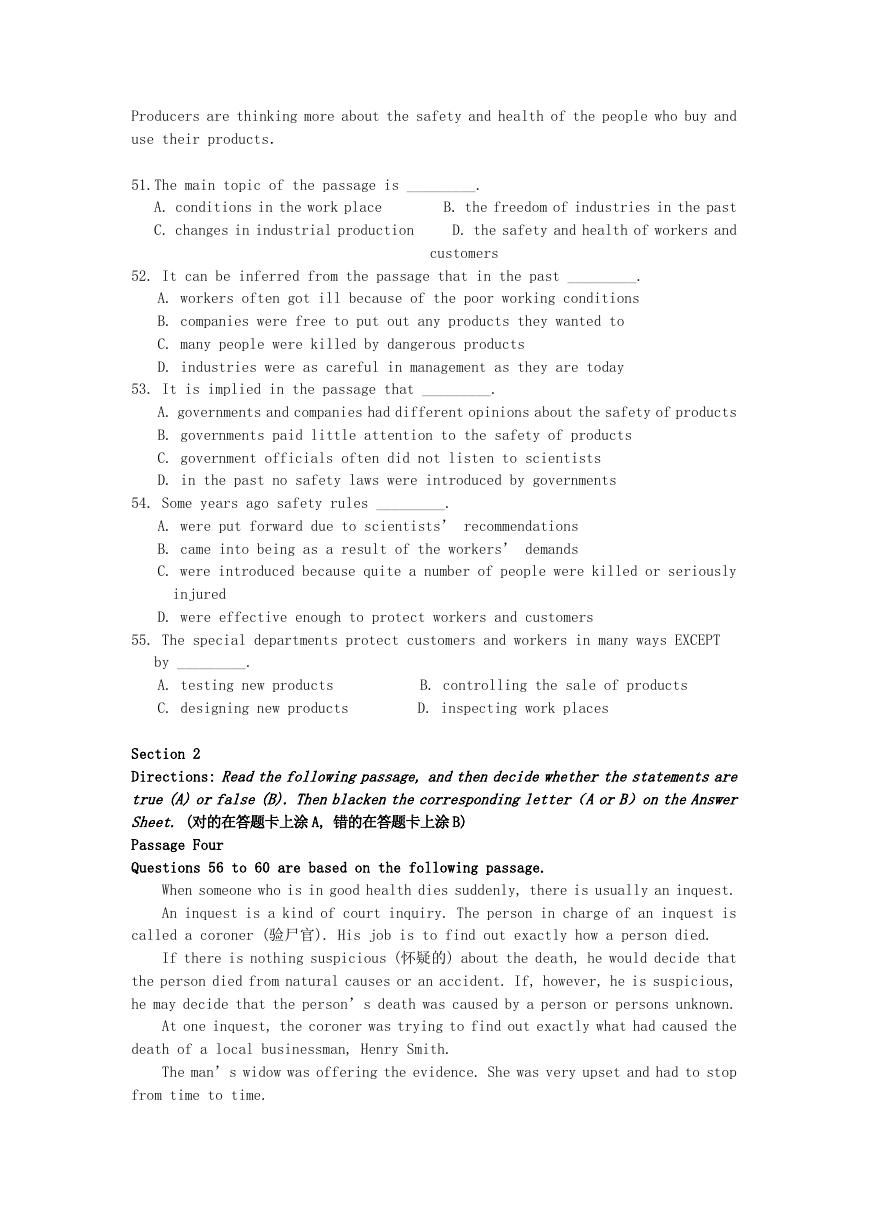
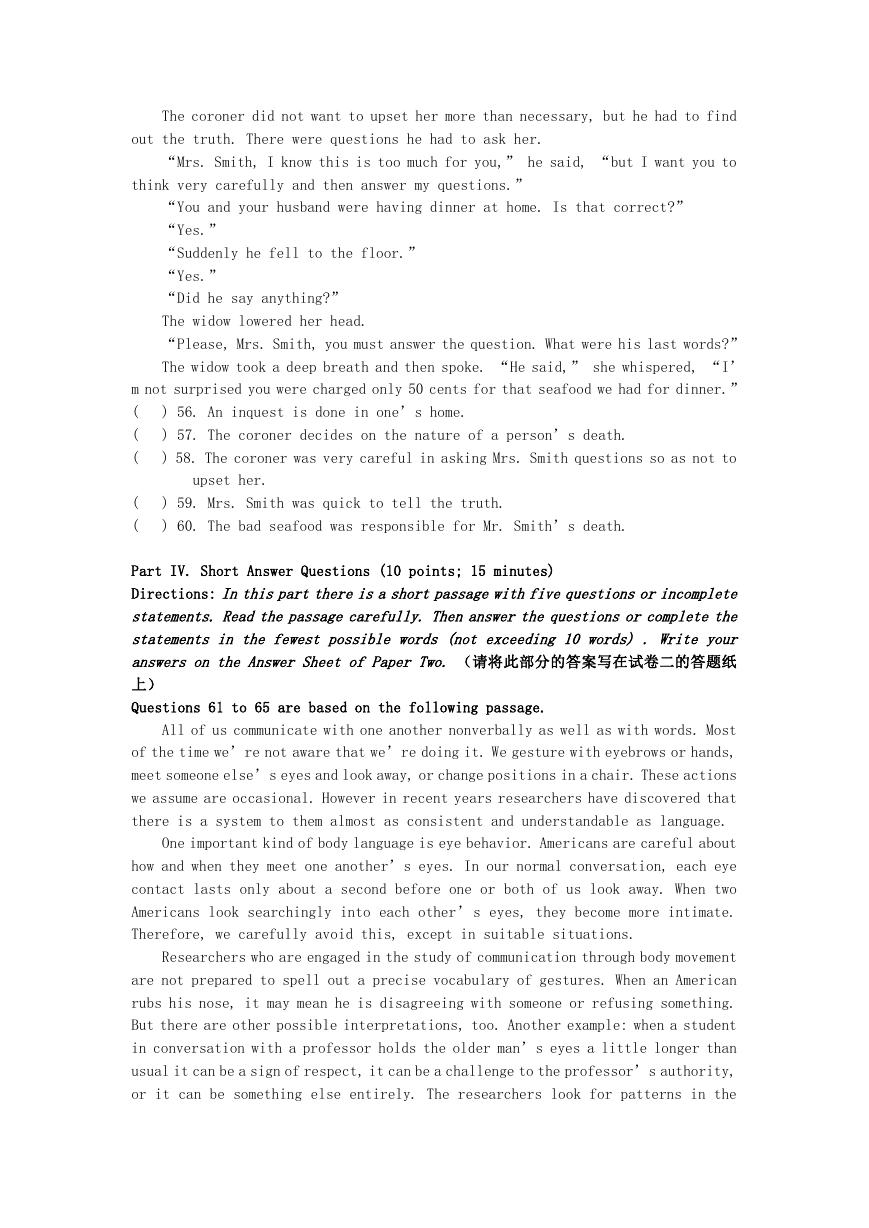








 2023年江西萍乡中考道德与法治真题及答案.doc
2023年江西萍乡中考道德与法治真题及答案.doc 2012年重庆南川中考生物真题及答案.doc
2012年重庆南川中考生物真题及答案.doc 2013年江西师范大学地理学综合及文艺理论基础考研真题.doc
2013年江西师范大学地理学综合及文艺理论基础考研真题.doc 2020年四川甘孜小升初语文真题及答案I卷.doc
2020年四川甘孜小升初语文真题及答案I卷.doc 2020年注册岩土工程师专业基础考试真题及答案.doc
2020年注册岩土工程师专业基础考试真题及答案.doc 2023-2024学年福建省厦门市九年级上学期数学月考试题及答案.doc
2023-2024学年福建省厦门市九年级上学期数学月考试题及答案.doc 2021-2022学年辽宁省沈阳市大东区九年级上学期语文期末试题及答案.doc
2021-2022学年辽宁省沈阳市大东区九年级上学期语文期末试题及答案.doc 2022-2023学年北京东城区初三第一学期物理期末试卷及答案.doc
2022-2023学年北京东城区初三第一学期物理期末试卷及答案.doc 2018上半年江西教师资格初中地理学科知识与教学能力真题及答案.doc
2018上半年江西教师资格初中地理学科知识与教学能力真题及答案.doc 2012年河北国家公务员申论考试真题及答案-省级.doc
2012年河北国家公务员申论考试真题及答案-省级.doc 2020-2021学年江苏省扬州市江都区邵樊片九年级上学期数学第一次质量检测试题及答案.doc
2020-2021学年江苏省扬州市江都区邵樊片九年级上学期数学第一次质量检测试题及答案.doc 2022下半年黑龙江教师资格证中学综合素质真题及答案.doc
2022下半年黑龙江教师资格证中学综合素质真题及答案.doc